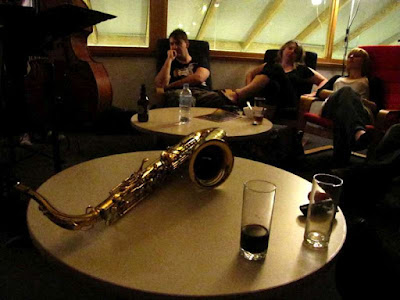The percussion section is so often little considered although they are not just like jazz drums, playing rhythm as important as that is, but they also play pitch with keyboard substitutes on vibes and marimba and pedals on timpani or tubular bells as well as the complexity on seemingly simple instruments like the triangle. They have to count, too! But this was Claire Edwardes of Ensemble Offspring fame and she played a solo gig so no sitting counting, but two keyed instruments, vibes and marimba, and the seemingly simple temple blocks, just 5 loud wooden blocks with the most complex of polyrhythms played. The concert was another eye opener and musically joyous and virtuosic. The melodies and harmonies and developments were immensely inviting and relatable to the most piano or other instruments, while the tone is relatively sharp and short, sometimes damped, otherwise ringing quietly. I am thinking vibes and metallics more than marimba with its wood. Claire played a quieter tune on vibes on coral bleaching called When it's gone by Julia Potter. Thanks to Claire's inviting presence, we heard of the stages of bleaching from lovely blue to forbidding white. Then Ross Edwards, those temple blocks, one from Amsterdam, a Brenda Gifford solo excerpt called Clan from Wadhu, and more Amsterdam contacts with Joyful melodies, a co-composition by Claire with Kate Moore. Just a joyous and virtuosic outing on solo percussion. Lovely!
Claire Edwardes (vibraphone, marimba, temple blocks, electronics) performed at Verity Lane for the Canberra International Music Festival.




















